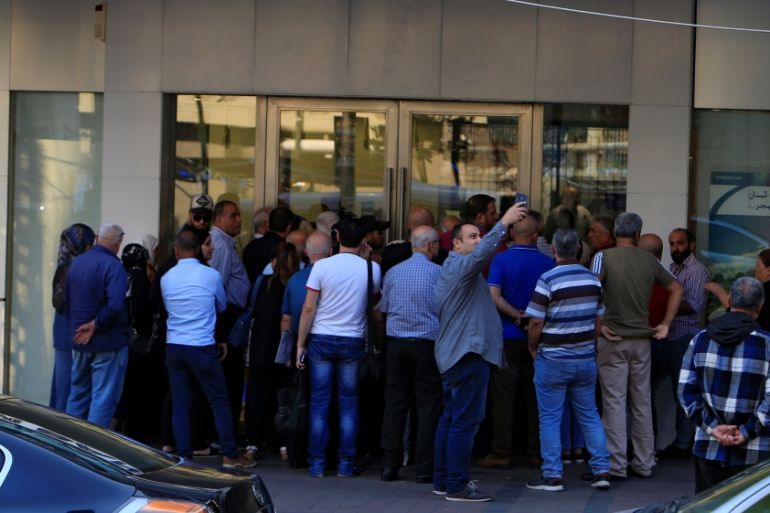Lebanon’s banks reopen after two-week closure
Orderly queues reflect determination by many Lebanese to return to business as usual in the wake of mass protests.

Beirut, Lebanon – Lebanon’s banks have reopened after two weeks of unprecedented protests that prompted the resignation of Prime Minister Saad Hariri and saw waves of people take to the streets to express discontent with a political establishment that has failed to take the economy out of crisis mode.
In the early morning on Friday, crowds gathered outside a number of banks in the capital, Beirut. Inside, orderly queues formed, dispelling fears that there would be a run on the banks when they finally opened their doors to customers again.
Keep reading
list of 3 itemsAs protests grow, Lebanese are ‘reclaiming’ public spaces
Lebanon is experiencing a social revolution
“I’ve been waiting to cash a cheque for more than two weeks,” Joe, a 39-year-old photographer, told Al Jazeera as he waited inside a branch of BLC Bank in East Beirut.
“I was worried that there would be big crowds, but it’s not too bad,” he said.
Many who had gone to conduct transactions said they had confidence in the banking system, despite some controls on the amounts they could withdraw.
“I wasn’t scared for my cash, but I needed to withdraw some after two weeks,” Marwan, a 50-year-old who works in the country’s telecommunications sector, told Al Jazeera from outside a branch of BLOM Bank in downtown Beirut.
Marwan noted he had been informed of a withdrawal limit of $2,500 a week, with a $5 charge for every $1,000 he takes out.
“This isn’t fair. I have bills to pay, for tuition for my kids. But hopefully it’s just for a short period of time. Let’s wait and see.”
Behind him, the bank’s facade had been defaced by some of the protesters who for 15 days have demanded that the politicians ruling the country since its civil war 30 years ago be held accountable for decades of corruption and mismanagement that have left the economy on the brink of ruin.
Despite its vitrine being cracked in many places – and despite the presence of a large green graffiti reading “F*** you BLOM Bank” – the branch reopened.
The lack of chaos at the country’s banks reflects a determination by many in Lebanon to return to business as usual after schools and universities – as well as many government institutions and private businesses – closed in the wake of protests.
Capital controls
The uprising has increased pressures on an economy that has stagnated for nearly 10 years. Remittances – a major source of foreign exchange for Lebanon – have started to ebb in recent months.
Pressure has grown on the country’s 20-year-old currency peg, which has kept the Lebanese pound fixed to the United States dollar at a rate of 1,507.50 Lebanese pounds per $1.
Rates in the parallel market, though, have soared past 1,800 Lebanese pounds ($1.19) in recent weeks.
To assuage a lack of confidence in the banking system among clients after two weeks of closure, many financial institutions extended opening hours for Friday and Saturday to 5pm local time.
Lebanon’s central bank had pledged it would not impose capital controls when banks reopened, promising not to limit the amount of US dollars that clients could withdraw or cap wire transfers of money abroad. But some customers reported that a number of banks have unofficially imposed curbs.
Some experts have said that capital controls are necessary to prevent dollars – already scarce – from being transferred out of Lebanon. But such a move could negatively impact the inflow of remittances due to uncertainty over whether they could later be withdrawn again.
As the country continues to grapple with its economic crisis, many protesters have called for banks, which continue to reap large profits, to pay higher taxes.
They have also called for an end to the dominant role of banks in the Lebanese economy and the resignation of the Central Bank governor, Riad Salame, in near-daily protests in front of the central bank building over the last two weeks.
On Friday morning, four activists entered the headquarters of the Association of Banks in Lebanon in downtown Beirut and locked themselves inside to protest banking policies, as well as the increasing dollarisation of some sectors of the economy.
The four were arrested, with a fifth protester outside the building being beaten and later arrested.
Mass protests have paralysed Lebanon for over a fortnight. Demonstrators are demanding that the caretaker government be replaced with a cabinet of independent experts who can lead Lebanon out of a deepening financial crisis, improve basic services such as electricity and water, and create a new, nonsectarian electoral law.
A middle-aged woman who had come to settle loans at a Bank of Beirut branch in East Beirut on Friday at about noon told Al Jazeera that she never recalled banks remaining closed for such a long period of time, including during the country’s 15-year civil war.
“I think the revolution has made us more civilised. There is no pushing, people are standing in line,” she said.
“We’ve been through so many events in this country, but in the end I still believe in the banking system – up till now.”